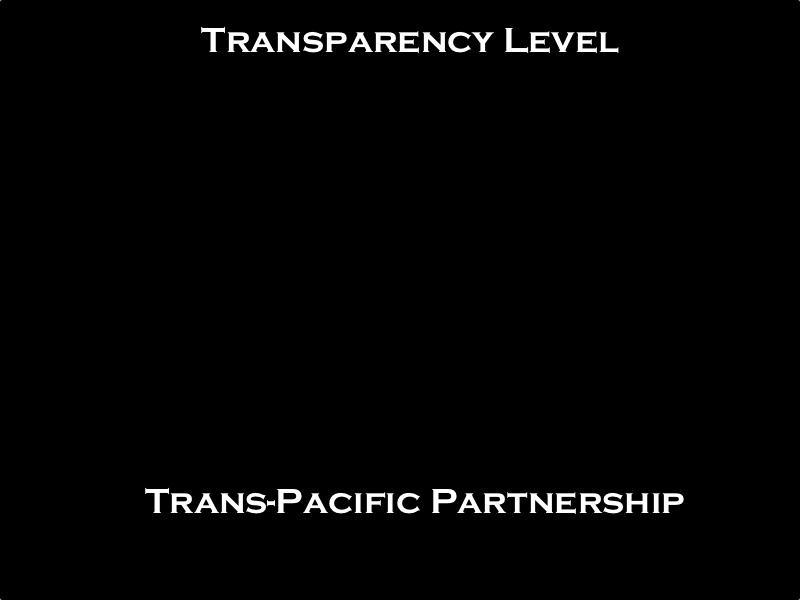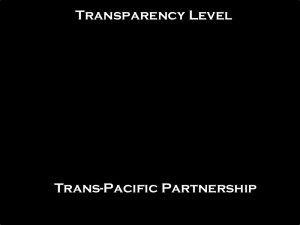
What You Don’t Know Can Hurt You
Lifestyle & Opinion September 21, 2012

In my last article we talked about privacy, and discovered that neither candidate is keen on you having it. We discussed the FISA Amendments Act Reauthorization Act of 2012 (H.R.5949) and the coming executive order on Cybersecurity. When it comes to the Trans-Pacific Partnership Agreement, the government is very interested in its privacy. What is the TPP? So glad you asked.
The Trans-Pacific Partnership Agreement, or TPP, is a wide ranging, multi-lateral trade agreement being negotiated by the United States Trade Representative. The USTR handles trade policy for the United States government, a position currently occupied by Ron Kirk. The TPP began under the Bush administration in 2007, and aims to expand the Trans-Pacific Strategic Economic Partnership Agreement of 2005. It includes the United States, Australia, Peru, Malaysia, Vietnam, New Zealand, Chile, Singapore and Brunei. Canada, and Mexico are also potential partners. Have you nodded off yet? Wake up! This treaty is being negotiated – lets say it all together now – behind closed doors, and without the public’s input.
When our privacy is up for grabs, we’re asked what we have to hide. What is the USTR hiding? Why keep the TPP documents secret? Remember the President’s speech. He told us how everyone needs to play by the same rules. While it is true that all stakeholders can attend the TPP negotiations, some stakeholders are more equal than others.
For instance, during the San Diego negotiations, the Motion Picture Association of America took the negotiators on a studio tour. Wining them, dining them and giving negotiators a chance to meet the stars. While that was going on, a group of scholars critical of the TPP got kicked out of their hotel, courtesy of Uncle Sam. That was an extreme measure, and not typical of negotiation protocol when dealing with groups like the EFF, American Library Association, and others with opposing views.
They give them their own little ghetto. While big business is upstairs educating negotiators, these groups sit under the watchful eye of law enforcement one floor down. Their hope is that a negotiator will come slumming, but they are under no obligation to do so. NGOs aren’t alone in the wilderness – the USTR has gone to great length to exclude members of another important American club.
That would be the United States Senate. The guys who will decide whether the TPP will be ratified. Your Senator can only view the actual TPP documents under the strictest secrecy. He must go in person, no aides or other employees need apply, to the USTR’s office. He may not bring anything to take notes with, because they aren’t permitted. The rumors of depraved blood oaths that a member of the Senate must swear before viewing the document must be an urban legend. Right? After which, he can read the TPP. This is a complex document, not the stuff of light Summer reading. But they’ll get plenty of time to study it in committee or on the Senate floor, right?
Probably not. The Obama Administration is insisting on fast track authority for the TPP. That means it skips the Senate committees and heads straight to the floor. Once there, Senators have 30 minutes to ratify the TPP or not. They may not amend the treaty, and 30 minutes isn’t enough time for proper debate. The message here is just shut up and pass it already.
Which would be bad for our free and open Internet. A leaked draft of the TPP obtained by the Electronic Frontier Foundation reveals many things, none of them comforting. For starters, there’s the issue of temporary copies. When you stream a copy of a video or music online, you’ve seen the message “buffering,” on screen. What is happening there is that the media is pouring a copy of itself into memory, so if your connection slows, you can still enjoy it. Groups representing rights holders have tried to claim this was copyright infringement. Thankfully, the cards didn’t fall their way in court. We have twenty years of precedent that says this is an acceptable exception to copyright. Other nations in the TPP don’t have this to fall back on. The leaked draft includes such temporary copies as infringement. This adds to the already baroque complexity of copyright internationally, and benefits no one but the handful of big media companies supporting this agreement. There was a similar strategy in play during the debate on SOPA. When things looked grim in the U.S., the content industry, with the cooperation of the USTR, went and leaned on Spain and Ireland who did pass laws similar to SOPA. Sure, that’s all the way over there, but this effects you too.
Fair use, the idea enshrined in our IP law, is that there are exceptions to copyright for education, for instance. Since the turn of the century, we’ve seen that the content industry aren’t fans of the concept, and neither is the Obama administration. According to the leaked documents, the TPP doesn’t eliminate it altogether, but the test for fair use is more stringent than current U.S. law. More worrisome is the fact that the Register of Copyrights is taking a hardline on Fair Use – a sign that the language in the leak might be accurate. Techdirt quoted from a speech she gave to the American Bar Association earlier this year.
“It is my strong view that exceptions and limitations are just that — they are important but they must be applied narrowly so as not to harm the proprietary rights of the songwriter, book author or artist. Copyright is for the author first, and the nation second.”
As Mr. Masnick’s article points out, her final words stand in stark contradiction to our Constitution, and our legal tradition in the United States. In addition, more stringent fair use standards are not about artists, but about large corporations who are more likely to engage in legal disputes with individuals. Over the past twenty years the government has handed them a number of tools to deal with infringement. The Digital Millennium Copyright Act of 1996, PRO-IP, and Six Strikes. These laws are frequently abused. We have seen the DMCA used to stifle legitimate speech. The government has shown no interest in punishing companies or individuals that abuse the law.
The TPP may hold many other ugly surprises for Americans, including a key provision of SOPA. That law attempted to make an end run on the DMCA’s Safe Harbor provision. There is reason to believe that the TPP is yet another attempt to whittle down Safe Harbor. The same people who brought you SOPA have the TPP negotiators’ undivided attention. In an interview with the Daily Dot, Senator Ron Wyden, a longtime critic of the TPP, expressed concern that the treaty could weaken section 230 of the Communications Decency Act. CDA 230 provides protection to sites that allow user comments, like this newspaper. Most of the sites you love would be out of business tomorrow without CDA 230 and DMCA Safe Harbor. There’s no way of knowing without seeing the text. The people who have aren’t talking.
Mitt Romney doesn’t know the specifics of the law any more than I do. Despite the threat it presents to the open Internet, he remains silent. I can only speculate as to why that might be. The TPP is about more than intellectual property; it covers a wide range of issues concerning international trade. The most generous portion of Mr. Romney’s constituency are conglomerates. Those businesses might be very eager indeed to see free trade with countries like Vietnam. Lax worker safety laws, low wages and a compliant government make many of the countries in the TPP attractive. No troublesome free press, or bloggers in Vietnam either. That country will cheerfully throw you in prison for writing an article like this one. Organizations like Minnesota Fair Trade believes that those 220,000 American manufacturing jobs the U.S. gained this year would be a mere memory under the TPP. As with SOPA, groups from across the political spectrum hate the TPP. From the Socialist Workers to Tea Party groups. Mitt was happy to denounce SOPA, so why hasn’t he spoken up about the Trans-Pacific Partnership?
Like President Obama, the cat appears to have gotten his tongue. Even if there is nothing sinister in the TPP, the way it is being negotiated is wrong. We’re righteously outraged when banks and oil companies write the laws that will regulate them. We’ve seen the damage that events like the financial meltdown, and Deepwater Horizon have caused. The USTR and the entertainment industry are writing our new IP laws the same way. Why should we believe the results will be any different? Why aren’t negotiators touring the U.S. library system? Why shouldn’t groups that are critical of our current IP laws have the same access as the MPAA and RIAA? Why keep our Senators in the dark, and why aren’t more of them asking pointed questions to the President about that? These are a few of the questions I’d have asked the President if he’d taken any on September 8th. He was right about one thing, we have two potential futures.
In one, you sit around and wait to find out what the law is after it’s passed. In the other, we chase the guys in ties down the street with shouts, war whoops and cat calls. We don’t leave them alone, we don’t give’em a moments peace, until they let us in. You know the drill. Register to vote. Candidates don’t care about people who don’t vote. Here’s Mitt Romney’s Facebook, email and Twitter. President Obama’s campaign can be yodeled at via Twitter, Facebook and email. Why not talk to him at 1600 Pennsylvania Avenue while you’re at it. He’s on G+, Twitter, Facebook and as always you can email him. If a Facebook page doesn’t allow you to post to their wall, use @pagename in a post to your wall to get their attention. In this article we’ve talked about the transparency, and the point where intellectual property meets civil liberties.
That’s where we’re going next week too, when we talk about the great grandfather of all Internet intellectual property laws: The Digital Millennium Copyright Act of 1996, a law despised by both the content industry, and civil libertarians. Like Deputy Dan, the DMCA has no friends. Find out why under the Internet Freedom tag next week.
